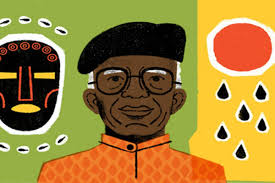 |
| Chicago Tribune photo |
Kurt Vonnegut's fourth novel was Cat's Cradle, written in 1963. It is perfectly bizarre, I loved it. As bizarre is that I didn't read Cat's Cradle until this week. I was aware of it back in my high school days, I just never read it -- probably because it wasn't required reading (unlike Slaughterhouse-Five). My loss.
The novel is a combination of pure sarcasm, science fiction, biting political commentary, and equally biting "comparative religion," with a touch of Mad Magazine thrown in to hold it all together.
The story's narrator is Jonah, a free-lance writer. He's working on what he hopes will become the book that will make him famous, about what important Americans were doing on the day the first atomic bomb was dropped, on Hiroshima, Japan. He will title it: The Day the World Ended.
On his list of people he hopes to write about is (the fictional) Dr. Felix Hoenniker, who in the book is the "father of the atomic bomb." He's a poorly paid scientist subcontracted by the Department of War. Hoenniker however is deceased, so Jonah sought to interview his three children as to what their father was doing on the day the bomb was dropped. Was he apprehensive, guilt ridden, or did he celebrate what would end World War II, and his role in it?
Jonah was able to interview two of the three children. Newt a "midget" who is the youngest child; and his sister Angela, who largely took care of the family after the death of their mother. Missing was the oldest son Frank who disappeared after his father's death, and is presumed murdered. Jonah does however uncover that Dr. Hoenniker was working on another secret invention, called ice-nine, at the time of his death, but appears to have taken its details to the grave with him.
After giving up on the book for awhile, Jonah receives an assignment to write a magazine piece about San Lorenzo, "the barracuda capital of the world" located somewhere in the Caribbean. On his flight to the island-country, he discovers that Angela and Newt are also onboard, on their way to brother Frank's wedding.
Through an endless series of hysterical circumstances, Jonah will discover the secret of ice-nine, and garner first-person documentation for The Day the World really Ended.
Recommendation: Yes, completely fun.





